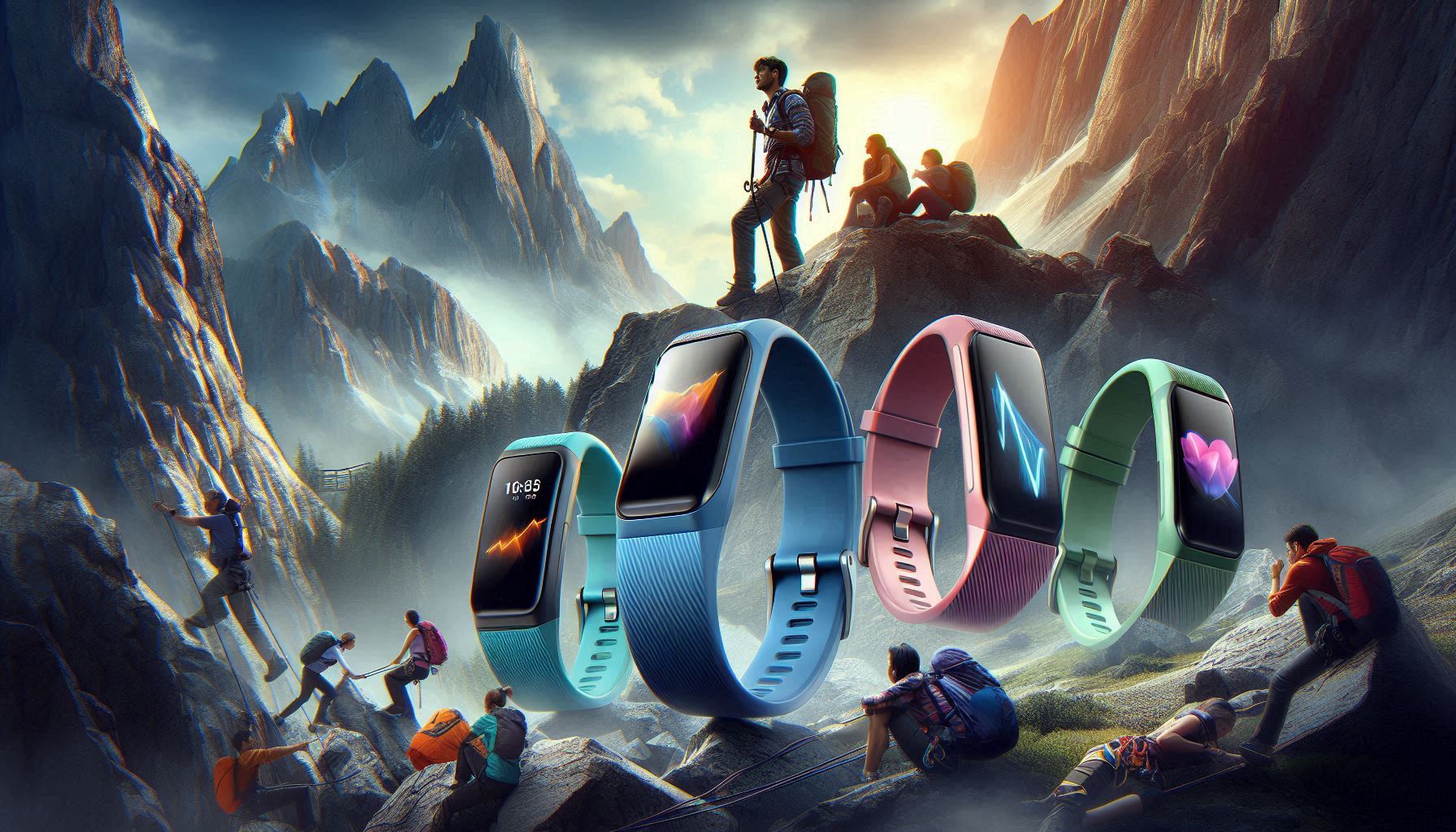In this article, we shall be taking a good look at the best 5 fitness trackers for climbing. Climbing is a popular sport in which thousands of people participate each week. Climbers are as focussed on tracking their health, performance and recovery as any other sportspeople. Let’s get started!
Introduction
Climbing is a sport that demands far more than just strength. It is a careful combination of endurance, mental focus, flexibility, and the ability to manage effort while maintaining balance and technique. Whether you are scaling indoor walls, taking on long outdoor routes, or tackling bouldering challenges, tracking your performance can give you valuable insights into how your body responds under stress.
This is where fitness trackers come in. A climbing focused wearable can monitor metrics such as heart rate, oxygen levels, elevation gain, and recovery status, helping climbers train smarter and climb with more confidence.
Unlike running or cycling, climbing requires precision tracking in unique conditions. A good climbing fitness tracker must be able to handle vertical movement, altitude changes, gripping hand positions, and varying levels of physical intensity. It should also be rugged enough to withstand chalk, sweat, and sometimes extreme environments.
In this article, we will explore the five best fitness trackers for climbing, breaking down their key features, prices, benefits, and trade offs so you can find the perfect device for your climbing journey.
What Makes a Fitness Tracker Good for Climbing
Climbing pushes the human body in ways that most wearables are not specifically designed for. The following features are the most important to look for when choosing a tracker for climbing:
☑ Elevation and altimeter tracking – to measure vertical gains and altitude changes
☑ Heart rate accuracy – especially important for endurance climbs and recovery monitoring
☑ Pulse oximeter (SpO2) – critical for high altitude climbers to assess oxygen levels
☑ Durability – resistance to impact, chalk, sweat, and rough conditions
☑ GPS and navigation – vital for outdoor climbers tackling routes in remote areas
☑ Battery life – long climbs require devices that last through extended sessions
With these features in mind, let us review the top five trackers best suited for climbing.
The Best 5 Fitness Trackers for Climbing
1. Garmin Fenix 7
The Garmin Fenix 7 is considered the gold standard for adventure sports, making it an excellent choice for climbers. It is built tough, designed for extreme conditions, and packed with features that matter when scaling walls or mountains.
Key Features
- Multi band GPS for precise outdoor navigation
- Barometric altimeter for elevation tracking
- Pulse oximeter for oxygen saturation levels
- Heart rate monitor with 24/7 tracking
- Rugged design with sapphire glass option
- Battery life of up to 18 days in smartwatch mode
Price
Around $700 to $900 US dollars depending on model.
Benefits
☑ Extremely durable for climbing and outdoor adventures
☑ Comprehensive climbing data including ascent metrics and altitude insights
☑ Long battery life suitable for multi day climbs
Pros
☑ Best navigation features in its class
☑ Highly accurate heart rate and SpO2 sensors
☑ Excellent durability
Cons
☑ Expensive compared to most trackers
☑ Bulky on smaller wrists
2. Suunto 9 Peak Pro
The Suunto 9 Peak Pro is another rugged outdoor watch designed for adventure athletes, with a sleek design that belies its toughness.
Key Features
- GPS and navigation with route tracking
- Altimeter, barometer, and compass
- Pulse oximeter for oxygen monitoring
- 24/7 activity and sleep tracking
- Battery life up to 21 days in smartwatch mode
- Extremely lightweight and slim design
Price
Around $550 US dollars.
Benefits
☑ Compact and lightweight compared to other adventure watches
☑ Ideal for climbers who want ruggedness without bulk
☑ Excellent for both gym climbing and alpine expeditions
Pros
☑ Strong build quality with stylish design
☑ Long lasting battery
☑ Precise GPS navigation
Cons
☑ Smaller screen than some competitors
☑ Fewer smart features compared to Garmin
3. Coros Vertix 2
The Coros Vertix 2 is designed for extreme athletes, including mountaineers and climbers who need robust durability and exceptional performance at high altitudes.
Key Features
- Dual frequency GPS for high accuracy in remote areas
- Altimeter, barometer, and compass sensors
- SpO2 sensor with dedicated altitude mode
- Titanium bezel with sapphire glass
- Incredible battery life up to 60 days in smartwatch mode
- 240 hours of continuous GPS tracking
Price
Around $700 US dollars.
Benefits
☑ Perfect for high altitude climbers and expeditions
☑ Unmatched battery life for long climbs
☑ Designed to withstand extreme conditions
Pros
☑ Exceptional durability and ruggedness
☑ Best battery life of any climbing wearable
☑ Advanced climbing and altitude monitoring
Cons
☑ Very large and heavy design
☑ Higher cost limits accessibility for casual climbers
4. Apple Watch Ultra
The Apple Watch Ultra brings the user friendliness of Apple devices into the outdoor and climbing space. With its larger screen and durable case, it has become popular among climbers who want both performance and smart features.
Key Features
- Built in climbing and hiking workout modes
- Dual frequency GPS for precise tracking
- Titanium case and sapphire crystal display
- Depth gauge and water resistance
- Heart rate and blood oxygen monitoring
- Up to 36 hours of battery life
Price
Around $800 US dollars.
Benefits
☑ Great balance of fitness and smart features
☑ Excellent visibility with large bright display
☑ Durable design suited for climbing environments
Pros
☑ Seamless integration with Apple ecosystem
☑ Reliable health and performance tracking
☑ Strong GPS and navigation
Cons
☑ Shorter battery life than Coros or Garmin
☑ Higher cost, especially for casual climbers
5. Fitbit Charge 6
For climbers who prefer a budget friendly option without sacrificing essential features, the Fitbit Charge 6 is an excellent entry point.
Key Features
- Continuous heart rate monitoring
- SpO2 tracking for oxygen levels
- Altimeter for elevation changes
- Lightweight slim band for comfort
- Water resistant design
- Battery life up to 7 days
Price
Around $160 US dollars.
Benefits
☑ Affordable for climbers new to wearables
☑ Tracks elevation gain and heart rate with good accuracy
☑ Lightweight and comfortable for long climbs
Pros
☑ Great value for money
☑ Simple user interface
☑ Wide compatibility with fitness apps
Cons
☑ Not as durable as premium outdoor watches
☑ Limited GPS capabilities without pairing to a phone
Who Should Use Climbing Fitness Trackers
- Outdoor climbers and mountaineers who need accurate navigation, elevation data, and oxygen monitoring.
- Indoor climbers and boulderers who want heart rate, endurance, and recovery insights.
- Expedition athletes requiring long battery life and robust devices.
- Beginners who want motivation and tracking to improve fitness and climbing progression.
Less suitable for:
- Those who climb occasionally and may not want to invest in expensive devices
- People who dislike bulky watches during climbs and prefer minimal gear
How to Get the Best From Your Wearable
☑ Wear it snugly – loose straps reduce sensor accuracy during climbs
☑ Enable climbing modes – dedicated profiles improve the accuracy of elevation and movement tracking
☑ Use navigation features – plan routes with GPS for outdoor climbs
☑ Track oxygen levels – especially important for high altitude climbing
☑ Log recovery – use sleep and HRV metrics to prevent overtraining
☑ Review long term trends – identify strengths and weaknesses to guide future training
Frequently Asked Questions
1. Do all fitness trackers have climbing modes?
No, not all fitness trackers include climbing modes. Premium devices from Garmin, Suunto, Coros, and Apple generally have climbing or hiking profiles built in.
2. Are heart rate monitors accurate while climbing?
Most wrist based sensors are reasonably accurate but can be affected by gripping. For the best results, pair with a chest strap.
3. Do I need an altimeter for climbing?
Yes, an altimeter is very useful for tracking elevation gain and descent, especially for outdoor climbing.
4. Are climbing trackers waterproof?
Most climbing wearables are water resistant, but not all are designed for deep water. Always check the rating before use.
5. Which climbing tracker has the best battery life?
The Coros Vertix 2 leads in battery performance with up to 60 days in smartwatch mode and 240 hours in GPS mode.
6. What is the best budget option for climbing?
The Fitbit Charge 6 offers essential climbing features at a much lower price, making it perfect for beginners.
Conclusion
Climbing is one of the most physically demanding and mentally rewarding activities, and the right fitness tracker can enhance the experience by providing valuable data and insights. From the powerful Garmin Fenix 7 to the ultra durable Coros Vertix 2, the market offers options for serious climbers who demand top performance in the toughest environments. The Suunto 9 Peak Pro is ideal for those who want ruggedness in a compact design, while the Apple Watch Ultra blends outdoor features with everyday usability. For those starting out, the Fitbit Charge 6 delivers excellent value at a fraction of the cost.
The best tracker for you depends on your climbing style, budget, and goals. Whether you are a weekend indoor climber or a mountaineer pushing limits at high altitude, a climbing focused wearable can help you monitor your progress, recover effectively, and stay safe on your routes. With the right device on your wrist, every climb can become a step toward greater performance and deeper enjoyment of the sport.
Our Thanks!
Our sincere thanks to you for reading this article on The Best 5 Fitness Trackers For Climbing. We hope that you have found it helpful with your search for a suitable fitness tracker. Take a look at our related article which is titled The Best 5 Fitness Trackers For Swimming.
Please let us know in the comments which fitness tracker you are currently using or plan to buy in the future!
**Here is a bit of transparency. Our website www.vertevia.com does contain affiliate links and Amazon links. So, if you did make a purchase through the website, we may receive a small commission. This is at no extra cost to you whatsoever. It’s just a way for you to support us as we continue to bring you top quality content**
All the best!
Eamon

